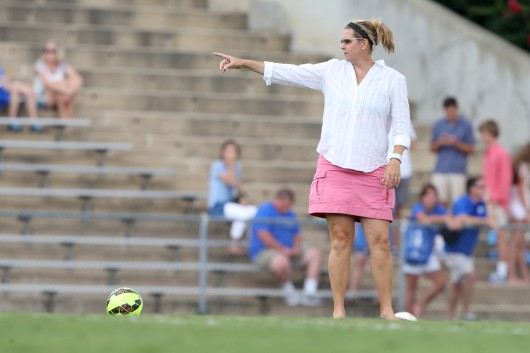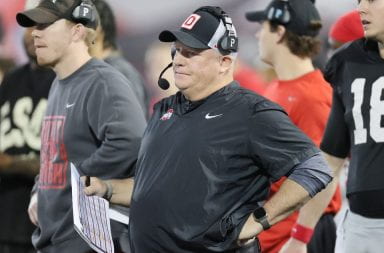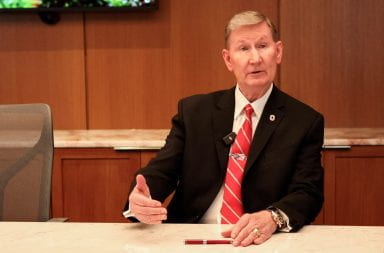
Women’s soccer coach Lori Walker, who is in her 18th season with the Buckeyes, picked up her 200th OSU win Sept. 12 against Indiana. Walker is winningest coach in program history.
Credit: Courtesy of OSU athletics
In her 18th season with the Ohio State women’s soccer team, coach Lori Walker joked that her hip hurts. Through 366 games with the Buckeyes, she’s stood for nearly 23 days, a price she’s had to pay for 200 wins.
“It’s humbling,” Walker said. “When you hit a milestone like that, you stop and you reflect and you think about all the people who have helped you along the way.”
Following the Buckeyes 2-1 overtime win against Indiana last Friday, Walker reached the 200-win plateau and continued her ascendance as OSU’s winningest coach in program history.
Former Buckeye assistant coach Greg Miller discussed Walker’s humility as one of many reasons for her success.
Miller, who became the University of Pittsburgh women’s soccer coach in 2012, said hiring coaches with different backgrounds and ideas has been a staple in Walker’s regime.
“Over the years (Walker’s) done a great job of surrounding herself with people that offset some of the things that maybe she’s not so strong in,” Miller said. “She’s always been very smart about that.”
Walker hasn’t shown too many weaknesses en route to a 200-135-31 record with the Buckeyes. Through the past 17 years, she has guided OSU to nine NCAA tournament appearances, having clinched a postseason berth in each of the past five seasons.
Despite her years of experience, she still frequents coaching seminars where she works to stay up-to-date with the game’s latest trends and technologies.
Requiring her team to wear heart-rate monitors is Walker’s latest scheme. The technology allows the coaching staff to gauge players’ work rates and recovery times, assistant coach Nick Flohre said.
Walker also works to see the game from different viewpoints, a process that began when she was a 24-year-old coach at the University of Kansas.
“I recognized if I wanted to stay in this profession and be a lifer then I really had to study the game,” she said.
When studying the game became dull, Walker said she turned to work as a television analyst for Olympic and FIFA Women’s World Cup matches to rekindle her interest.
“I got to a point where I was a little bored and stagnant in my coaching,” Walker said. “Broadcast was a wonderful way for me to study the game at a different level.”
But while she works to incorporate new methods to her coaching, she has remained grounded in one of her core coaching principles.
“She doesn’t sugarcoat anything,” junior goalkeeper Jillian McVicker said. “She wants everyone to be the best they can possibly be, so she demands a lot out of us and keeps the standard really high.”
Walker’s connection with her players might be best explained through a story Miller recounted from his time with the Buckeyes.
In a team meeting during the 2010 season, Walker confided to her team that they were going to the College Cup. Walker’s players countered her claim with a dumbfounded response, only to be surprised when their coach’s assertion proved correct.
The College Cup, which is the equivalent of the NCAA tournament in basketball also includes 64 teams.
Walker’s confidence in her program has not waned since then, and according to her players, neither has her expectation of success.
Justification for the high standards expected from OSU can be found in Walker’s many accomplishments. She was named Big Ten Coach of the Year in 2001 and 2010 and has helped OSU to three Big Ten championships.
Given Walker’s success, there’s no room for uncertainty on her teams.
“We don’t have time for doubt in college sports,” Walker said. “(Players) only get 3 1/2 (years) to be excellent and (coaches) have to try to get them there as fast as we can.”
Before coaching, Walker made the most of her time at the University of North Carolina as a goalkeeper on four national championship teams.
Immediately following her playing career, Walker began developing her relentless approach to coaching.
Walker spent two years as the first women’s soccer coach at the University of Kansas and three seasons as an assistant under former U.S. Women’s National Team coach April Heinrichs at the University of Maryland.
“That was a critical time to my development,” Walker said of her time with the Terrapins. “(Heinrichs) was a great mentor for me.”
Both stops presented different challenges. With the Jayhawks, Walker was a young coach in a brand new program. Prior to that, at Maryland, Walker was responsible for coaching a 21-year-old goalkeeper, as a 21-year-old assistant coach.
As she ages, Walker said she now must work harder to keep personal relationships with her players. The key is listening, she said.
Walker is the first to respond to players with personal issues, Flohre said.
“Off the field, she truly cares about us as people and our development as women,” McVicker said. “She genuinely cares about us.”
Walker’s love for the job doesn’t seem to be slowing. While reflecting on her milestone, she digressed to ponder the idea of her 300th win.
That mark may be down the road, but if that day comes, Walker will probably still be on her feet for it.
Correction: Sept. 18, 2014


